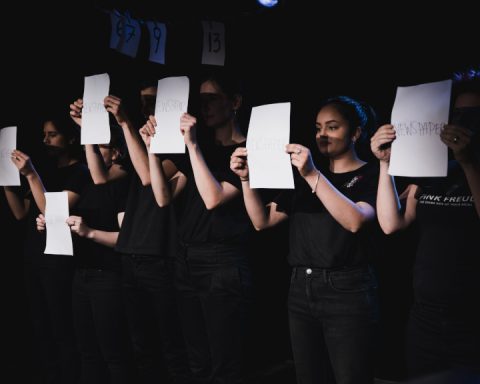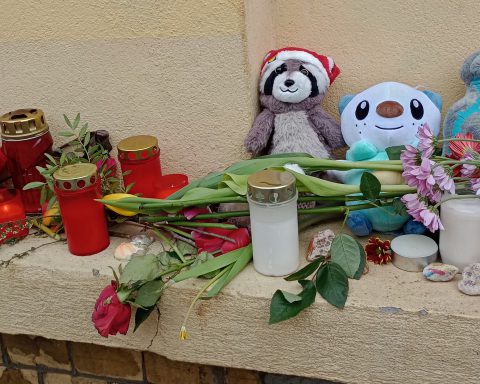What makes a play enjoyable?
Exiting a party, an acquaintance tells me he will “definitely” enjoy Exit Stage Right when he goes to see it this weekend. Because he’s sure people have put their hearts and souls into it. They have lost sleep, or skipped meals, to make it happen. He knows at least some of the people in English Theatre Leipzig (ETL), which is staging the play. He’s not one to behave like a nitpicking theatre critic, he adds.

And therein lies the spirit of non-profit, community theatre, in a small city like Leipzig. Many often attend the play of the season because friends are performing in it. The performers need this sort of validation and support to keep going, as they don’t get a salary or big-name awards. It’s more important that the people on stage love what they’re doing rather than performing like professional actors, which most of them are not, anyway. Most – except for a small core group – tend to be hobby performers, donating their energy when they have the time.
This all means that one indeed shouldn’t hold ETL to the same standards as, say, the well-established Schauspiel Leipzig. One also doesn’t want to hurt anybody’s feelings unnecessarily, especially the young kids dipping their toe in shyly, tentatively, on a school night. And one wants to support and encourage English-language performance arts in Leipzig, which in itself is quite a feat to keep going. Others have tried and found themselves having to stop after a while, due to the lack of support, of funds, of a firm base of commitment, even of a united troupe eschewing big egos and pettiness for a greater cause.

And therein lies the conundrum.
Do you tell them when you didn’t fully enjoy their play?
I think you should tell them – but tactfully, constructively. Tell them to keep staging those plays. Tell them to keep acting, directing, producing, even through the lack of resources and the times of deep frustration. But also tell them to do better next time, because their loyal audience deserves it. They deserve to be able to improve as well – and feedback is an important part of it – so that they can get more recognition, more funding. So that they can keep going, for all of us who appreciate independent English-language theatre.
Therefore, here I am. English Theatre Leipzig, here it is: Exit Stage Right could have been better.
First the positive parts, though. I really liked what you tried to do, with the vignettes loosely connected by the thread of farewells. Six different directors (and styles of directing), 11 different plays. It was a daring experiment. Standout performances moved the audience, made us laugh, sigh or cringe at times, as different stories paraded before us: professional actress Nicola Chapman as an insecure aging actress rushing out of an audition (Stage Kiss); Ann-Kristin Iwersen as a blossoming woman, departing wife (Salt in the Hair); Laura Shann as a long-suffering wife being left (The Labor of Life); Elmar Lordemann as a grieving husband waiting to depart and join his wife (Two); Emily Wessel as a Brexit ditz, customer, sage (in three scenes!); Danny Coposescu trying to depart to heaven, while Emily Bantelman plays three characters who get in his way (“Waiting” from Almost an Evening).
Plus, the lighting was used very effectively to enhance the minimalist, easily interchangeable set, whose changes were smoothly executed.
Now for the caveats. The acting carried the play to an extent; but in some scenes, acting levels were mismatched, and a couple of the scenes felt pretty amateurish. And the overall decent acting couldn’t really make up for the play’s lack of a unifying message, of some sort of workable synopsis. It felt long, and bits of it were tiring. This is no Paris, Je T’aime – it was incongruous, and not in an artsy way. Most of the scenes – the three Brexit-related ones excluded – shared only the broad theme of farewells. Their juxtaposition felt awkward.
In other words, perhaps the order of the scenes could’ve been different so the transitions made more sense.
Perhaps, also, better material could’ve been selected, more fleshed out and complete individually, while complementary. And then the tone was often a bit off: In a few scenes, emotions were exaggerated. In a couple of others, there wasn’t enough emotion. It could’ve been the fault of the scripts, some of which were contrived.

Artistic director Tom Bailey tells me that someone came to him and criticized the play’s lack of flow, but that its choppiness was actually intentional. I’d say, listen to them, Tom. But not completely. Keep the daring spirit going, and your core team coming back so it can be further developed as a troupe. Be open to learning from mistakes, and give them your own Leipzig, Je T’aime at some point. It is quite difficult to achieve this brilliance, this balance, but please keep pursuing it. The German-language LVZ has been keeping up with ETL – a recognition of the value of your art, even in English!
I could see how much the English Theatre cast and crew put into Exit Stage Right, and I did enjoy quite a few moments of the play.
There was a workshop preceding it, where ETL got a lot of the performers from – helping them hone their craft in-house, developing them. Along with that, a new collaboration has sprung up with the equally as enthusiastic people from Ubiquity Theatre; this is one of the performance groups that stopped their English incarnation, but which thankfully didn’t give up on it – headed by Laura Shann, who both acted and directed in Exit Stage Right.
For the love of theatre, of English, of this sort of inclusiveness, of small independent productions, of the still-improvised spirit of Leipzig… and also for some genuinely funny and philosophical moments amid the daring cacophony of the “choruses” in this play… go see Exit Stage Right. This Friday and Saturday, at Neues Schauspiel. Tickets this way. Or you can buy them at the venue’s bar while supplies last.











